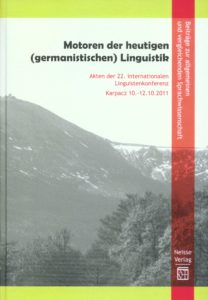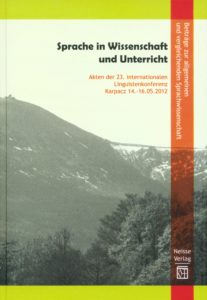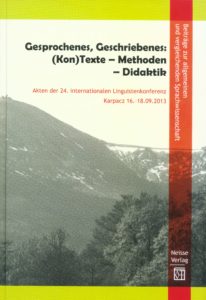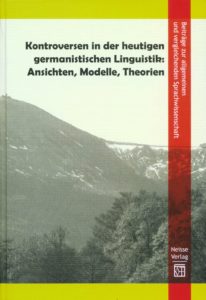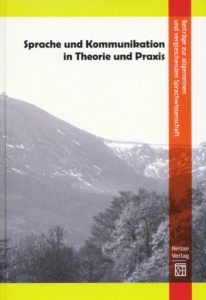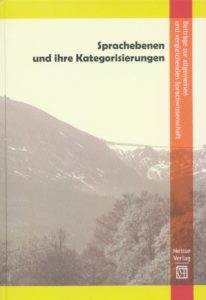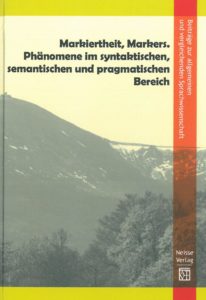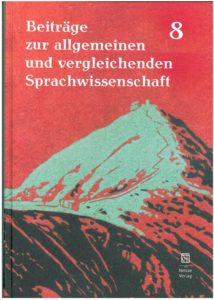Contributions to General and Comparative Linguistics
ISSN 2299-4122, e-ISSN 2657-4799
Oficjalna strona czasopisma: https://beitraege-contributions.pl
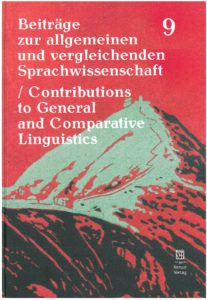 Czasopismo Beiträge zur allgemeinen und vergleichenden Sprachwissenschaft ukazuje się pod podanym tytułem od 2012 roku, pod tytułem dwujęzycznym Beiträge zur allgemeinen und vergleichenden Sprachwissenschaft / Contributions to General and Comparative Linguistics od 2020 roku. Jest kontynuacją wydawniczą, publikowaną wcześniej w wielotomowej i wielotematycznej serii Beihefte zum Orbis Linguarum (po raz pierwszy w 2006 roku). Czasopismo ukazuje się pod patronatem Dziekana Wydziału Filologicznego Uniwersytetu Wrocławskiego. Jest wydawane w Oficynie Wydawniczej ATUT (Wrocław) i Neisse Verlag Silvia und Detlef Krell GbR (Dresden). Redaktorami czasopisma są Edyta Błachut i Adam Gołębiowski (Instytut Filologii Germańskiej UWr) oraz Dorota Klimek-Jankowska i Krzysztof Migdalski (Instytut Filologii Angielskiej UWr).
Czasopismo Beiträge zur allgemeinen und vergleichenden Sprachwissenschaft ukazuje się pod podanym tytułem od 2012 roku, pod tytułem dwujęzycznym Beiträge zur allgemeinen und vergleichenden Sprachwissenschaft / Contributions to General and Comparative Linguistics od 2020 roku. Jest kontynuacją wydawniczą, publikowaną wcześniej w wielotomowej i wielotematycznej serii Beihefte zum Orbis Linguarum (po raz pierwszy w 2006 roku). Czasopismo ukazuje się pod patronatem Dziekana Wydziału Filologicznego Uniwersytetu Wrocławskiego. Jest wydawane w Oficynie Wydawniczej ATUT (Wrocław) i Neisse Verlag Silvia und Detlef Krell GbR (Dresden). Redaktorami czasopisma są Edyta Błachut i Adam Gołębiowski (Instytut Filologii Germańskiej UWr) oraz Dorota Klimek-Jankowska i Krzysztof Migdalski (Instytut Filologii Angielskiej UWr).
Decyzją Ministra Edukacji i Nauki czasopismo zostało wpisane na ministerialną listę czasopism punktowanych z następującą ilością punktów: 70 (komunikat z dn. 01.12.2021 r.).
Czasopismo jest indeksowane w następujących bazach danych:
Index Copernicus
Pol-index
BazHum
ICM (Interdyscyplinarne Centrum Modelowania Matematycznego i Komputerowego)
CEJSH
Erih Plus
MLA International Bibliography
CEEOL (Central and Eastern European Online Library)
EBSCO
REDAKCJA
KONTAKT
ADRES REDAKCJI
| Instytut Filologii Germańskiej
Pl. Nankiera 15 b 50-140 Wrocław E-Mail: beitraege.wroclaw@wp.pl TEL. +48 71 3752 801 |
WYDAWCA
Oficyna Wydawnicza ATUT ul. Kościuszki 142 50-439 Wrocław
|
RADA NAUKOWA
Członkowie Rady Naukowej i recenzenci współpracujący z Beiträge zur allgemeinen und vergleichenden Sprachwissenschaft:
- prof. zw. dr hab. Lesław Cirko (Uniwersytet Wrocławski),
- prof. Antoni Dębski (Uniwersytet Jagielloński),
- prof. Ulrich Engel (Heppenheim),
- prof. Maria Katarzyna Lasatowicz (Uniwersytet Opolski),
- prof. Karin Pittner (Ruhr-Universität Bochum),
- prof. Christoph Schatte (Poznań),
- prof. Józef Wiktorowicz (Uniwersytet Warszawski)
OPIS FUNKCJONOWANIA KOMITETU REDAKCYJNEGO I RADY NAUKOWEJ
Regulamin powoływania i funkcjonowania Komitetu Redakcyjnego i Rady Naukowej „Beiträge zur allgemeinen und vergleichenden Sprachwissenschaft”
KOMITET REDAKCYJNY jest powołany z grona pracowników Instytutu Filologii Germańskiej Uniwersytetu Wrocławskiego przez Radę Instytutu na czas nieokreślony.
Komitet Redakcyjny „Beiträge zur allgemeinen und vergleichenden Sprachwissenschaft” tworzą:
Redaktor Naczelny;
Redaktorzy Merytoryczni (przewidziani na stałe do każdego zeszytu – 2; dodatkowi w danym zeszycie, jeśli zachodzi potrzeba – max. 3);
Redaktor Językowy;
Zadania Komitetu Redakcyjnego
Komitet Redakcyjny odbywa posiedzenia przynajmniej dwa razy w roku – w związku z zatwierdzeniem aktualnego i otworzeniem kolejnego zeszytu „Beiträge zur allgemeinen und vergleichenden Sprachwissenschaft” i jest zwoływany przez redaktora naczelnego. Zadaniem Komitetu jest przyjęcie zeszytów przygotowanych do przekazania do opracowania wydawniczego, podejmowanie decyzji związanych z publikacją lub rozstrzyganie kwestii wątpliwych – związanych np. z rozbieżnościami opinii recenzentów lub złożonymi wyjaśnieniami autorów tekstów w odpowiedzi na opinie recenzentów. Zadaniem Komitetu jest pozyskiwanie dla czasopisma członków Rady Naukowej oraz Recenzentów. Zadaniem Komitetu jest również czuwanie nad jakością czasopisma.
Rada Naukowa i Recenzenci
Radę Naukową oraz Recenzencką tworzą specjaliści z różnych obszarów językoznawstwa. Ich zadaniem jest opiniowanie tekstów, czuwanie nad jakością czasopisma oraz wspieranie redaktorów czasopisma w kwestiach merytorycznych. Przewodniczący Komitetu Redakcyjnego lub jego członek może wnieść wniosek o powołanie nowego członka Rady Naukowej lub nowego Recenzenta wraz z krótkim uzasadnieniem tego wniosku. Przyjęcie dokonuje się zwykłą większością głosów.
The terms of appointing and functioning of the Editorial Board and Advisory Board of “Beiträge zur allgemeinen und vergleichenden Sprachwissenschaft“
THE EDITORIAL BOARD is appointed for an indefinite period from the employees of the Institute of German Studies, University of Wrocław, by the Board of this Institute.
Editorial Board of „Beiträge zur allgemeinen und vergleichenden Sprachwissenschaft” consists of:
The Editor-in-Chief;
Theme Editors (2 for each issue at all times; max. 3 additional ones in a given issue, as far as they are needed);
Language Editor.
The tasks of the Editorial Board
The Editorial Board meets at least twice a year in order to approve the current issue of „Beiträge zur allgemeinen und vergleichenden Sprachwissenschaft” and to open the next one. The sessions are called by the Editor-in-Chief. The Board is responsible for approving the issues ready to be sent to the editors at the Publishing House, deciding on matters relating to publishing, and resolving doubts concerning e.g. differences in reviewers’ opinions or complex explanations of the authors in regard to reviewers’ opinions. The Board’s tasks include inviting new Reviewers and members to the Advisory Board. It is also the Board’s responsibility to monitor the quality of the journal.
Advisory Board and Reviewers
The members of the Advisory Board and the Reviewers are specialists from different fields of linguistics. Their task is to review the papers, monitor the quality of the journal, and help the editors of the journal in regard to content-related issues. The Head of the Editorial Board or any other member may put forward a proposal to appoint a new member of the Advisory Board or a new Reviewer. A short description of reasons for the appointment should be included in the proposal. The member is accepted to the Board by the simple majority of votes.
WARUNKI PUBLIKACJI
Rozpatrywane są wyłącznie teksty spełniające wymogi formalne określone we wskazówkach edycyjnych. W pierwszym etapie kwalifikacji zgłoszonych tekstów redaktorzy zastrzegają sobie prawo do ich doboru zgodnego z profilem aktualnie wydawanego tomu. Następnie do oceny każdego tekstu redaktorzy powołują dwóch niezależnych recenzentów zewnętrznych. Teksty recenzowane są z zachowaniem zasady anonimowości. Recenzja ma formę pisemną i zawiera rekomendację dotyczącą publikacji artykułu. Ostateczną decyzję o przyjęciu do druku pozytywnie zrecenzowanego tekstu podejmuje zespół redakcyjny po zasięgnięciu opinii rady naukowej.
DLA AUTORÓW
Proszę zapoznać się z informacjami opublikowanymi poniżej.
INFORMATION FOR AUTHORS
Information for authors
- The Editorial Board accepts previously unpublished scholarly papers in linguistics. The Editorial Board does not return non-commissioned submissions.
- By submitting their articles to the journal’s Editorial Board the authors a) state that they hold the copyright rights to the articles, that the articles are free from any defects of title and that they have not been previously published elsewhere in their entirety or in part nor have they been submitted to any other journal, and b) grant their consent, free of charge, to have their articles published in Beiträge zur allgemeinen und vergleichenden Sprachwissenschaft and disseminated without any limitation as to the time and territory, including by marketing copies of the journal as well as making them available on the internet free of charge and in exchange for a fee.
- Length: article – 65 000 characters including spaces.
- Formal requirements: font – Times New Roman 12, line spacing – 1.5, footnotes. Authors are obliged to submit texts conforming to the requirements of Beiträge zur allgemeinen und vergleichenden Sprachwissenschaft available on http://www.ifg.uni.wroc.pl/magazine/beitraege-zur-allgemeinen-und-vergleichenden-sprachwissenschaft/ and on Dla Autorów The titles, names and surnames of authors cited in the submissions originally written in alphabets other than the Latin alphabet must be transliterated into the Latin script.
- Manner of submission: articles should be sent in electronic form (MS Word document: DOC/DOCX or RTF) via e-mail sent to: beitraege.wroclaw@wp.pl. Submissions not conforming to the required standards may not be taken into account in the selection process.
- The authors will be informed about whether their articles have been accepted for publication in Beiträge zur allgemeinen und vergleichenden Sprachwissenschaft within ten weeks days via e-mails sent to the addresses provided by them.
- Articles submitted for publication are reviewed, and the reviews are confidential and anonymous (double-blind review). A list of reviewers is published in every issue of the journal in a given year. The reviewers’ comments are sent to the author who is obliged to take into account the corrections suggested by the reviewers or to send an explanation if he or she decides not to take them into account. The Editorial Board refuses to accept an article for publication in the case of two negative reviews.
- The Editorial Board seeks to prevent cases of ghostwriting and guest authorship, which are manifestations of scholarly dishonesty. Ghostwriting is a situation when someone has made a significant contribution to an article without revealing his or her role as one of the authors or without being mentioned in the acknowledgements. We are dealing with guest authorship when an individual’s contribution is very limited or non-existent and yet he or she is listed as the author/co-author of an article. Such practices are combatted by making open the information about the contributions of the various authors to an article (information about the author of the concept, assumptions, methods, protocol etc. used when writing the article).
- All articles presenting results of statistical research are submitted to the statistical editor.
- The top left-hand side corner of the title page of the submission should contain details concerning the author/authors (e-mail addresses and telephone numbers, work place, affiliation in the case of academics). What is also recommended is an ORCID (Open Researcher and Contributor ID) profile making it possible to follow the author’s work online. The ORCID number should be indicated under the author’s/authors’ details.
- Each submission in German should be accompanied by a short (maximum 10 sentences) summary and title of the article in English as well as 5-6 key words in English. The summary should specify the subject matter, aims and main conclusions.
- The publishing house reserves the right to introduce editorial changes into submitted articles.
- Authors are obliged to make corrections to their articles within 7 days of receiving the relevant comments. A failure to make the corrections within the deadline signifies that the author agrees to have his or her article published in the form submitted for proofreading.
- By submitting the article, the author agrees for it as well as its basic data, including its summary in English and the author’s details (name and surname, institution, e-mail address) and key words to be included in the online version on http://www.ifg.uni.wroc.pl/magazine/beitraege-zur-allgemeinen-und-vergleichenden-sprachwissenschaft/.
- Authors do not receive any fee for their articles.
- After an article has been published, its author receives one printed copy of Beiträge zur allgemeinen und vergleichenden Sprachwissenschaft free of charge.
ZESZYTY - WYDANIA ONLINE
WSZYSTKIE TOMY
tom 1/2012
tom 2/2013
tom 3/2014
tom 4/2015
tom 5/2016
tom 6/2017
tom 7/2018
tom 8/2019
ZASADY ETYCZNE
I. OBOWIĄZKI AUTORÓW
Rzetelność prac naukowych jest podstawowym elementem ich jakości. Autorzy powinni zaprezentować wyniki badań w sposób rzetelny, wiarygodny, uczciwy i niebudzący wątpliwości.
W czasopiśmie Beiträge zur allgemeinen und vergleichenden Sprachwissenschaft wydawane są jedynie artykuły naukowe o oryginalnym charakterze, które nie zostały opublikowane ani zgłoszone do druku w innym czasopiśmie, monografii lub pracy zbiorowej. Zgłaszanie tego samego tekstu do publikacji w kilku miejscach jest nieetyczne i nie jest akceptowane. Dotyczy to również artykułów publikowanych pierwotnie w innych językach.
Przyjęte artykuły nie mogą ukazywać się w innych źródłach bez pisemnej zgody Redaktora naczelnego i/lub Wydawcy.
Kluczowym kryterium oceny zgłoszonego tekstu jest obiektywizm analiz oraz niebudząca wątpliwości i możliwa do zweryfikowania przez innych prezentacja problemu badawczego i metody jego opracowania. Nieprawdziwe twierdzenia, fałszowanie wyników badań, manipulacja danymi, uważane są za nieetyczne i nie są akceptowane.
W każdym przypadku, gdy w tekście przywoływane są twierdzenia, wyniki badań lub dane opracowane przez innych autorów, fragment taki musi być opatrzony przypisem i/lub zamieszczony w formie cytatu. Autorzy powinni przygotować tekst w oparciu o odpowiednią literaturę przedmiotu, kluczową dla prezentacji problemu badawczego. Informacje uzyskane w rozmowie lub korespondencji z osobami trzecimi mogą być przytoczone w tekście jedynie po uzyskaniu wyraźnej, pisemnej zgody takich osób.
Jeśli Autor nie zna cytowanej pracy, kopiowanie odesłań do niej z innych publikacji jest nieetyczne.
Bez pisemnej zgody danej osoby lub jej przedstawiciela prawnego autorzy nie mogą publikować i udostępniać indywidualnych danych identyfikacyjnych, zebranych w trakcie badań.
Czasopismo wdrożyło zaporę ghostwriting i guest publishing. Przypadki guest publishing i ghostwriting uznane są za nieetyczne i nie są akceptowane. Autorstwo ogranicza się do osób, które miały znaczący wpływ na ustalenie koncepcji, założeń, metod badawczych oraz na realizację zamysłu badawczego. W przypadku przygotowania tekstu przez kilku autorów, każdy z nich jest zobowiązany do złożenia oświadczenia o wkładzie w powstanie tekstu i musi udzielić odrębnej zgody na zgłoszenie artykułu do publikacji w czasopiśmie Beiträge zur allgemeinen und vergleichenden Sprachwissenschaft. Autorzy są zobowiązani do ujawnienia nazwisk wszystkich osób, które miały wkład w przygotowanie artykułu.
Należy ujawnić wszystkie źródła finansowania badań naukowych oraz innego rodzaju wsparcia przy przygotowywaniu publikacji.
W przypadku wkładu innych osób w przygotowanie artykułów, w tym w finansowania badań naukowych, odpowiedzialność za naruszenie ich praw autorskich do tekstu ponosi zgłaszający go autor.
Wszelkie wykryte przejawy i przypadki nierzetelności naukowej będą ujawniane, a informacje o nich będą przekazywane odpowiednim podmiotom (instytucje zatrudniające autorów, towarzystwa naukowe itp.).
II. OBOWIĄZKI REDAKTORÓW I KOMITETU REDAKCYJNEGO (RADY REDAKCYJNEJ)
Komitet Redakcyjny, redaktorzy czasopisma Beiträge zur allgemeinen und vergleichenden Sprachwissenschaft podejmują decyzję w sprawie publikacji zgłoszonego tekstu, kierując się zgodnością z profilem czasopisma, jakością naukową (merytoryczną) nadesłanej pracy, oryginalnym charakterem zawartych w niej badań, twierdzeń i analiz. Żadnego wpływu na ocenę tekstu nie mają obywatelstwo, pochodzenie etniczne, rasa, płeć, orientacja seksualna czy przekonania religijne i polityczne autorów.
Wszystkie informacje dotyczące Autora, w jakich posiadaniu są Komitet i redaktorzy, są poufne.
Informacje o nadesłanej pracy mogą zostać ujawnione przez redaktora naczelnego, redaktorów, członków Komitetu wyłącznie autorowi/autorom tekstu, recenzentom, potencjalnym recenzentom, konsultantom redakcyjnym (np. tłumaczom) i wydawcy.
Osoby wymienione w punkcie trzecim, które otrzymały informacje o pracy, nie mogą wykorzystać zawartych w niej wyników, danych, twierdzeń, opinii, analiz etc. do czasu publikacji artykułu.
Członkowie Komitetu i redaktorzy mają obowiązek przestrzegania aktualnego stanu prawnego dotyczącego praw autorskich, ochrony danych osobowych, zniesławienia i plagiatu. Obowiązkiem członków Komitetu i redaktorów jest dążenie do wyeliminowania przypadków plagiatu oraz praktyk guest authorship i ghostwriting.
W przypadku skarg o naruszenie zasad etyki publikacji naukowych, skierowanych do redakcji czasopisma Beiträge zur allgemeinen und vergleichenden Sprachwissenschaft autor/autorzy zgłoszonego do publikacji tekstu są informowani pisemnie o zarzutach z prośbą o ustosunkowanie się do nich. Brak odpowiedzi lub odpowiedź budząca uzasadnione wątpliwości skutkuje przesłaniem informacji o sprawie instytucjom, w których afiliowani są i/lub z którymi współpracują autorzy.
III. OBOWIĄZKI RECENZENTÓW
Każdy zgłoszony do publikacji artykuł naukowy recenzowany jest przez dwóch niezależnych recenzentów zewnętrznych. Przyjęta przez czasopismo Beiträge zur allgemeinen und vergleichenden Sprachwissenschaft procedura double-blind gwarantuje, że autor i recenzenci nie znają swych tożsamości.
Recenzenci wskazani przez Komitet Redakcyjny czasopisma Beiträge zur allgemeinen und vergleichenden Sprachwissenschaft są zobowiązani do poinformowania redakcji o niepodjęciu się opiniowania tekstu z uwagi na brak kwalifikacji lub czasu. W takim przypadku redaktor naczelny w porozumieniu z Komitetem Redakcyjnym wskazuje innego recenzenta w terminie do 14 dni.
Tekst przekazany do recenzji jest traktowany jak materiał poufny. Recenzent nie może pokazywać i/lub omawiać tekstu z innymi osobami niż członkowie Komitetu Redakcyjnego czasopisma Beiträge zur allgemeinen und vergleichenden Sprachwissenschaft. Wyniki badań, dane, opinie, twierdzenia zawarte w tekście zgłoszonym do publikacji nie mogą być wykorzystane przez recenzenta w jego własnych badaniach do czasu publikacji artykułu.
Podstawowym obowiązkiem recenzenta jest obiektywna ocena tekstu. Krytyka czyniona ze względów osobistych jest niewłaściwa. Wszelkie komentarze, oceny i sugestie powinny być wskazane w sposób jasny i wsparte argumentami.
W procesie recenzowania uwzględniane są następujące kryteria: naukowy charakter zgłoszonego tekstu; oryginalność przeprowadzonych badań; sposób realizacji celów naukowych i jasna prezentacja problemu badawczego; właściwe wykorzystanie literatury przedmiotu; należyte uzasadnienie twierdzeń i wniosków, zgodność z profilem tematycznym czasopisma.
Recenzent informuje Komitet redakcyjny o podejrzeniu ghostwriting, guest authorship i/lub plagiatu albo tzw. autoplagiatu przez osobę zgłaszającą tekst do publikacji, wskazując fragment/fragmenty tekstu budzące wątpliwości.
Szczegółowe zasady procedury recenzowania przyjętej przez czasopismo Beiträge zur allgemeinen und vergleichenden Sprachwissenschaft zamieszczone są na stronie internetowej w zakładce „Dla autorów”.
IV. POSTĘPOWANIE W PRZYPADKACH PODEJRZENIA O PLAGIAT, AUTOPLAGIAT, GUEST AUTHORSHIP I GHOSTWRITING
Plagiat we wszystkich formach stanowi nieetyczną praktykę i nie jest akceptowany.
W przypadku podejrzenia o plagiat, Komitet Redakcyjny czasopisma Beiträge zur allgemeinen und vergleichenden Sprachwissenschaft stosuje procedurę sprawdzającą z udziałem recenzentów i osoby zgłaszającej tekst.
W przypadku potwierdzenia bezprawnego użycia tekstu, twierdzeń, wyników badań, danych, autor zgłoszonego do publikacji artykułu jest informowany na piśmie o odrzuceniu tekstu.
W przypadku stwierdzenia zasadności podejrzeń o plagiat zawiadamiana jest instytucja/instytucje, z którymi współpracuje i/lub w której afiliowany jest autor.
W przypadku stwierdzenia tzw. autoplagiatu, gdy autor w zgłoszonym do publikacji artykule zamieszcza wcześniej opublikowane fragmenty tekstu własnego autorstwa bez odpowiednich informacji, sekretarz redakcji z upoważnienia redaktora naczelnego i za zgodą Komitetu Redakcyjnego czasopisma Beiträge zur allgemeinen und vergleichenden Sprachwissenschaft informuje autora/autorów pisemnie o odmowie publikacji artykułu z uwagi na brak oryginalnego charakteru analiz.
Przypadki guest authorship i ghostwriting uznane są za nieetyczne i nie są akceptowane. W przypadku stwierdzenia zasadności podejrzeń co do guest authorship i ghostwriting autor zgłoszonego do publikacji artykułu jest informowany na piśmie o odrzuceniu tekstu z powodu istniejących wad prawnych. O sprawie zawiadamiana jest instytucja/instytucje, z którymi współpracuje i/lub w której afiliowany jest autor.
ETHICS
I. Authors’ duties
The reliability of a scientific/scholarly text is essential for its quality. The Authors should present the outcome of their research in a well founded, honest, thorough and unequivocal way.
In the journal Beiträge zur allgemeinen und vergleichenden Sprachwissenschaft only original scientific/scholarly articles are published which were not published in or submitted to another journal, monograph or collection of studies. Submitting the same text for publication in several sources is unethical and unacceptable. This concerns also articles previously published in other languages.
The articles accepted to be published in Beiträge zur allgemeinen und vergleichenden Sprachwissenschaft cannot appear in other sources without written permission of the Editor-in-Chief or/and the Publisher.
The main evaluation criterion of the submitted articles is the objective character of the analyses, as well as the unequivocal and verifiable presentation of the problem and the methods of its elaboration. Providing false observations, faking research results, manipulating the data are considered to be unethical and unacceptable.
In each case when the text refers to observations, research, results or elaboration of a given problem proposed by other authors the referred-to fragment should be cross-referenced and/or included as a quotation. Authors should base the text on appropriate related literature, crucial for the research problem. Information acquired in a conversation or via correspondence with other persons may be quoted in the article only with the univocal written consent of these persons.
If the Author is not familiar with a given text, copying references to it from other works is considered unethical.
Authors cannot publish or disclose individual identification data of another person, acquired in the course of the research, without the permission of the person concerned or of her/his legal representative.
The journal has implemented procedures that will prevent cases of ghostwriting and guest publishing. Both ghostwriting and guest publishing are concidered unethical and unacceptable. The authorship is limited only to those persons that had a considerable share in defining the basic concepts, assumptions, research methods and the realization of the ideas. In the case of multiple authorship of a given article each Author is obliged to define his/her contribution and to supply a written consent to submit the article in the journal Beiträge zur allgemeinen und vergleichenden Sprachwissenschaft. Authors are obliged to provide the names of all persons that contributed to preparing the article for publication.
All the sources of research funding and other kind of research support should be specified.
The responsibility for the disclosure of actual contributors as well as sources of research funding is on the Author.
All cases of scientific dishonesty will be exposed and documented by the editors who will pass information about such dishonesty to relevant institutions (the Author’s place of employment, scientific societies etc.).
II. The duties of the Editors, the Editorial Board (the Advisory Board)
The Editorial Board and the editors of the journal Beiträge zur allgemeinen und vergleichenden Sprachwissenschaft make decisions concerning the publication of the submitted article, respecting the compliance with the profile of the journal, the scientific (substantive) quality of the submitted articles as well as the originality of the presented research, conclusions and analyses. Citizenship, ethnic origin, race, gender and sex, sexual orientation or the Authors’ religious beliefs will not have any impact on the evaluation of the article.
All the information concerning the Author possessed by the Editorial Board and the editors is confidential.
Information concerning the submitted article may be revealed by the Editor-in-Chief, the editors and the members of the Editorial Board (the Advisory Board) only to the Author(s) of the text, reviewers or prospective reviewers, editorial consultants (e.g. translators) and the Publisher.
The persons enumerated in p. 3 who received information concerning the article are obliged not to utilize the results, data, conclusions, opinions, analyses, etc. it contains until the article is published.
The members of the Editorial Board are obliged to observe the current law concerning copyright, protection of personal data, libel and plagiarism. They are also obliged to do everything possible to eliminate cases of plagiarism as well as ghostwriting and guest authorship.
In the case of complaints concerning violation of ethical principles of scientific publications addressed to the editors of the journal Beiträge zur allgemeinen und vergleichenden Sprachwissenschaft the Author(s) of the submitted article are informed in writing about the allegations and are asked to address them. Lack of any answer or an answer raising justified doubts will result in sending information concerning the case to institutions with which the Author is affiliated or with which he/she cooperates.
III. Reviewers’ duties
Each submitted article is reviewed by two independent Reviewers from without the institution with which the Author is affiliated. The double-blind procedure is deployed ensuring that the Author and the Reviewers are ignorant as to each other’s identity.
The Reviewers appointed by the Editorial Board of the journal Beiträge zur allgemeinen und vergleichenden Sprachwissenschaft are obliged to inform the editors about resigning from reviewing the article due to the lack of qualifications or time. In this case the Editor-in-Chief in agreement with the Editorial Board appoints another Reviewer within 14 days.
The reviewed text is treated as confidential. The Reviewer may not show and/or discuss the text with persons other than the members of the Editorial Board of the journal Beiträge zur allgemeinen und vergleichenden Sprachwissenschaft The research results, data, opinions, statements included in the submitted article may not be utilized by the Reviewer until the article is published.
The Reviewer’s primary duty is to evaluate the article objectively. Any personal innuendoes or remarks are considered improper. All comments, evaluations and suggestions should be clear and supported by appropriate arguments.
In the process of reviewing the following criteria should be taken into account: scientific/scholarly character of the submitted text; innovative quality of the research; methodological awareness and clear stating of the research problem; proper use of the state of research; logical argumentation and justification of the conclusions; appropriateness to the profile of the journal.
The Reviewer informs the Editorial Board about a suspicion of ghostwriting, guest authorship, plagiarism and/or so called autoplagiarism committed by the person submitting the article, pointing out the dubious fragment(s) of the article.
Details of the reviewing procedure adopted by the journal Beiträge zur allgemeinen und vergleichenden Sprachwissenschaft can be found on the journal’s website on the tab “For Authors”.
IV. Procedures in the case of a suspicion of plagiarism, autoplagiarism, guest authorship and ghostwriting
Plagiarism in any form is unethical and unacceptable.
In the case of a suspicion of plagiarism the Editorial Board of the journal Beiträge zur allgemeinen und vergleichenden Sprachwissenschaft applies the examination procedures involving the Reviewers and the person submitting the text.
In the case of confirming an unlawful use of somebody else’s text, statements, research, results, data the Author of the submitted article is informed in writing about rejecting his/her text.
In the case of confirming suspicions of plagiarism the editors inform the institution with which the Author is affiliated or with which he /she cooperates.
In the case of confirmed autoplagiarism, when the Author includes in the submitted article fragments of his own texts already published without proper information, the Assistant Editor under the authority of the Editor-in-Chief and with the agreement of the Editorial Board of the journal Beiträge zur allgemeinen und vergleichenden Sprachwissenschaft informs the Author(s) in writing about rejecting the submission due to lack of originality of the presented analyses.
Cases of ghostwriting and guest authorship are unethical and unacceptable. In the case of confirming the suspicions of ghostwriting and guest authorship the Author of the submitted article is informed in writing of rejecting the text due to legal defect. The case is reported to the institution with which the Author is affiliated and/or with which he/she cooperates.

